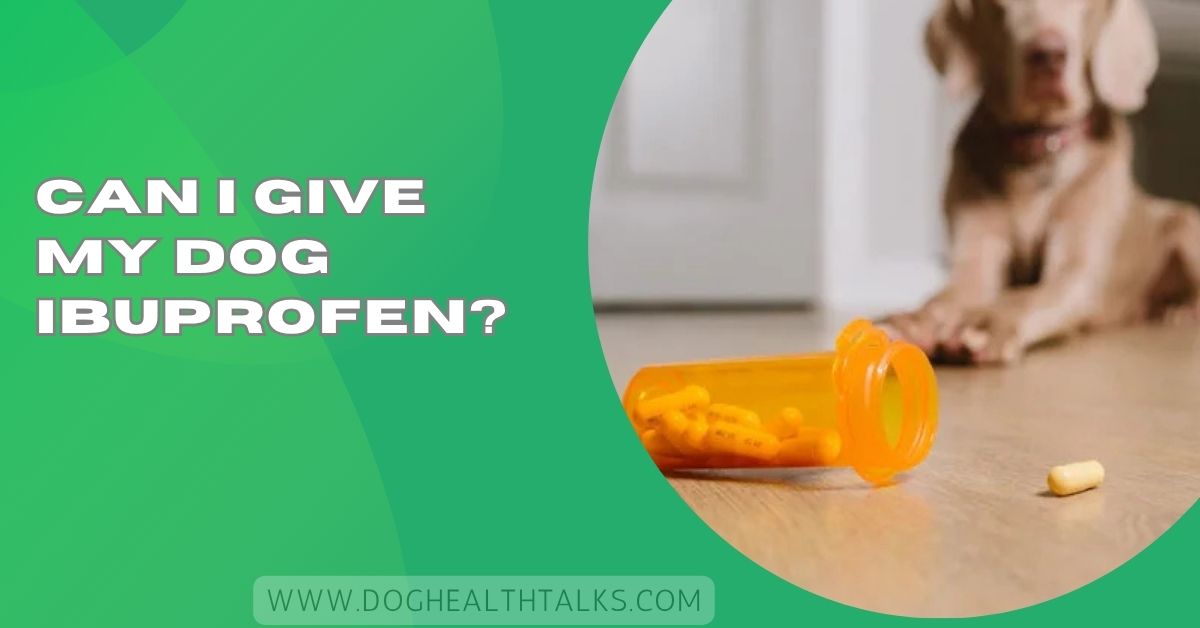Can I Give My Dog Ibuprofen – Vets Reveal the Answer (2026)
As dog owners, we never want to see our furry friends in pain. Whether it’s an injury, sore muscles, or arthritis, it’s natural to want to help them feel better quickly. Many people reach into their medicine cabinet and wonder, “Can I give my dog ibuprofen?”
The short and most important answer is no you should never give your dog ibuprofen. While this common pain reliever is safe for humans, it’s extremely dangerous for dogs and can lead to serious, sometimes fatal, health problems.
In this guide, we’ll explain exactly why ibuprofen is unsafe, what symptoms to watch for if your dog accidentally ingests it, and what safer options exist for managing pain in pets.
What Is Ibuprofen and Why Pet Owners Consider It
Ibuprofen is a type of medication called a non-steroidal anti-inflammatory drug (NSAID). It’s found in popular brands like Advil and Motrin, and it works by reducing inflammation and pain in humans.
Because it works so well for people, many dog owners assume it can also help their pets when they’re limping, aching, or recovering from surgery.
Unfortunately, dogs process drugs very differently than humans. Their bodies can’t safely handle ibuprofen, even at small doses.
Veterinarians often see emergency cases where dogs are brought in after owners gave them just one or two pills. What may seem harmless to you can be life-threatening to your dog.
Why Ibuprofen Is Dangerous for Dogs

Ibuprofen affects a dog’s body in harmful ways. It works by blocking enzymes that produce prostaglandins substances that control inflammation and pain. However, prostaglandins also protect vital organs, like the stomach and kidneys.
When ibuprofen blocks these enzymes in dogs, it strips away that protection. This can quickly lead to:
- Stomach ulcers and bleeding
- Kidney damage or kidney failure
- Intestinal perforations
- Internal bleeding
- Neurological issues in severe cases
Unlike humans, dogs don’t metabolize ibuprofen effectively. Even a small dose can build up in their system, leading to toxicity.
Veterinarians strongly warn against giving any human pain relievers to dogs, especially ibuprofen, acetaminophen (Tylenol), or naproxen (Aleve).
Toxic Doses: How Much Ibuprofen Can Harm a Dog
It doesn’t take much to cause harm. For example, a standard 200 mg tablet the smallest human dose can be toxic for a small dog weighing under 20 pounds.
Here’s a general idea of how dangerous ibuprofen can be:
- 50 mg per pound can cause stomach ulcers
- 100 mg per pound can damage kidneys
- 200 mg per pound or more may lead to death
Because of these risks, you should never try to calculate or “guess” a dose at home. Even giving a “tiny piece” of a pill can lead to poisoning. Dogs are simply too sensitive to human medications.
Also Read: Why Dogs Cough After Drinking Water – Vet-Approved Guide!
Symptoms of Ibuprofen Poisoning in Dogs
If your dog has swallowed ibuprofen, symptoms may appear within hours. Early signs often include:
- Vomiting or diarrhea
- Loss of appetite
- Drooling or lip-licking
- Abdominal pain
As the poisoning progresses, more severe symptoms may develop, such as:
- Black or bloody stools
- Weakness and lethargy
- Pale gums (from internal bleeding)
- Frequent urination or no urination (kidney failure)
- Seizures or collapse in extreme cases
The timeline depends on how much your dog ate and their size. Some dogs show symptoms within a few hours, while others develop issues over a day or two.
If you suspect your dog has ingested ibuprofen, don’t wait for symptoms to appear. Call your veterinarian or a pet poison control hotline immediately.
What to Do If Your Dog Ate Ibuprofen

The first step is to act fast. Do not try home remedies or wait to “see what happens.” Immediate veterinary care can make the difference between recovery and tragedy.
Here’s what you should do:
- Call your veterinarian right away. Tell them how much ibuprofen your dog may have ingested and when.
- If it’s after hours, contact an emergency veterinary hospital or the ASPCA Animal Poison Control Center.
- Do not induce vomiting unless your vet specifically tells you to. In some cases, this can make things worse.
- Bring the pill bottle with you to the clinic so the vet can see the exact medication and dosage.
At the clinic, treatment may include:
- Inducing vomiting under medical supervision
- Giving activated charcoal to absorb remaining toxins
- IV fluids to protect the kidneys
- Medications to prevent stomach ulcers and internal bleeding
Dogs treated quickly have a much better chance of recovery.
Safe Pain Relief Alternatives for Dogs
If your dog is in pain, don’t worry there are safe and effective pain relievers designed specifically for pets. These medications are approved by the FDA for dogs and prescribed by veterinarians.
Common examples include:
- Carprofen (Rimadyl) – often used for arthritis or post-surgery pain
- Meloxicam (Metacam) – for chronic pain and inflammation
- Deracoxib (Deramaxx) – for orthopedic pain
- Firocoxib (Previcox) – another NSAID approved for dogs
These medicines are formulated to be safe for dogs at the correct dose. Your vet will determine which one suits your dog’s condition best.
If you prefer more natural approaches, some supportive methods can also help, such as:
- Rest and gentle activity control
- Cold or warm compresses for sore areas
- Weight management for dogs with joint pain
- Omega-3 supplements (vet-approved) for inflammation
Always discuss any pain management plan with your veterinarian before giving anything new.
Must Read: How to Clean Dog Vomit on Wood Floors – Proven 2026 Guide!
How to Prevent Ibuprofen Poisoning in Dogs
Prevention is simple but vital. Most ibuprofen poisonings happen accidentally when dogs get into pill bottles or someone gives a human dose out of concern.
Follow these steps to keep your dog safe:
- Store all human medications in closed cabinets, out of reach.
- Never leave pills on counters, tables, or in bags.
- Educate your family not to share human medicine with pets.
- Dispose of old or unused medication safely.
- Ask your vet before giving any over-the-counter drug to your dog.
Even one mistake can have severe consequences, so treating ibuprofen as a poison rather than a pain remedy for pets is the safest mindset.
Can You Give A Dog Aspirin

You can sometimes give a dog aspirin, but only under a vet’s advice. Even small mistakes in dosage can cause stomach bleeding or other issues. It’s safer to use vet-approved pain medicine instead of human drugs like aspirin.
What Painkillers Can I Give My Dog
Only painkillers prescribed by a veterinarian are safe. Common vet-approved options include Carprofen, Meloxicam, and Deracoxib.
Human painkillers like ibuprofen, Tylenol, or naproxen can be toxic to dogs and should never be given without professional supervision.
What Can You Give A Dog For Pain Relief At Home
At home, avoid giving human medicine. You can help by letting your dog rest, using a soft bed, gentle massage, or a cold compress on sore spots. Always ask your vet before trying any supplement or natural remedy.
Can You Give A Dog Tylenol
No, never give a dog Tylenol. It can cause liver failure and other life-threatening reactions. Tylenol (acetaminophen) is made for humans and isn’t safe for pets. If your dog seems to be in pain, contact your veterinarian immediately.
What Can I Give My Dog For Immediate Pain Relief
For fast relief, only a vet can safely prescribe medication like Carprofen or Meloxicam. Don’t use human drugs. Until you see the vet, keep your dog calm, limit movement, and use a cold or warm compress for comfort.
You Should Know: How Do I Know If My Dog Has Parvo – Vet-Approved Guide!
What Can You Give A Dog For Pain Relief Over The Counter
No over-the-counter human pain medicine is safe for dogs. Avoid ibuprofen, aspirin, and Tylenol. Instead, use vet-approved dog pain relievers or natural care methods. Always talk to your veterinarian before giving any medication or supplement.
What If My Dog Ingested Ibuprofen?
If your dog ate ibuprofen, call your vet or an emergency clinic immediately. Don’t wait for symptoms to appear. Ibuprofen can damage the stomach and kidneys quickly. Fast treatment can save your dog’s life, so act right away.
Conclusion
In conclusion, if you’re asking can I give my dog ibuprofen, the safest answer is no — always consult your veterinarian before giving your dog any human medication.
Seeing your dog in pain can be heartbreaking, and it’s natural to want to help right away. However, giving ibuprofen or any human painkiller to your pet can do far more harm than good. Even small doses can cause stomach ulcers, kidney failure, or worse.
The safest way to care for a dog in pain is to contact your veterinarian. They can recommend the right medication and dosage based on your dog’s size, age, and health condition. There are many safe, vet-approved pain relievers made specifically for dogs that can provide effective relief without dangerous side effects.
Always store human medicines out of reach, and never guess or experiment with your pet’s treatment. When in doubt, call your vet it’s the best way to protect your furry friend and ensure they stay happy, healthy, and pain-free.
FAQ’s
What Pain Reliever Can You Give a Dog?
Only vet-prescribed medicines like Carprofen or Meloxicam are safe. Human painkillers can be toxic and should never be used.
What Can I Give My Dog For Pain Relief at Home?
Let your dog rest, use a soft bed, gentle massage, or a cold compress. Always ask your vet first.
What Human Medication Can I Give My Dog For Pain?
None. Human medicines like ibuprofen or Tylenol are dangerous for dogs. Only give pain relief prescribed by your veterinarian.
How Much Ibuprofen Can I Give My Dog?
None at all. Even a small dose of ibuprofen is toxic for dogs and can cause bleeding or kidney failure.
Can I Give My Dog Anything For Pain Without a Vet?
No. Only a veterinarian can safely prescribe pain medicine. Home remedies help, but human drugs are never safe for dogs.
Can I Give My Dog Aspirin For a Limp?
Don’t give aspirin unless your vet approves it. It can cause stomach bleeding and serious side effects in dogs.
Is Tylenol Ok For Dogs?
No, Tylenol is unsafe for dogs. It can cause severe liver damage or death. Always contact your veterinarian for help.
What is The Best Anti-Inflammatory For Dogs?
Vet-approved options like Carprofen, Meloxicam, or Deracoxib are safest. They reduce pain and swelling without harming your dog’s organs.






